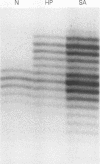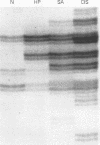Abstract
AIM: To investigate the distribution of DNA microsatellite instability (MSI) in a series of hyperplastic polyps, serrated adenomas, and mixed polyps of the colorectum. METHODS: DNA was extracted from samples of 73 colorectal polyps comprising tubular adenomas (23), hyperplastic polyps (21), serrated adenomas (17), and mixed polyps (12). The presence of MSI was investigated at six loci: MYCL, D2S123, F13B, BAT-40, BAT-26, and c-myb T22, using polymerase chain reaction based methodology. MSI cases were classified as MSI-Low (MSI-L) and MSI-High (MSI-H), based on the number of affected loci. RESULTS: The frequency of MSI increased in tubular adenomas (13%), hyperplastic polyps (29%), serrated adenomas (53%), and mixed polyps (83%) (Wilcoxon rank sum statistic, p < 0.001). Hyperplastic epithelium was present in nine of 12 mixed polyps and showed MSI in eight of these. MSI was mostly MSI-L. MSI-H occurred in two serrated adenomas and three mixed polyps. Clonal relations were demonstrated between hyperplastic and dysplastic epithelium in four of eight informative mixed polyps. CONCLUSIONS: The findings support the view that hyperplastic polyps may be fundamentally neoplastic rather than hyperplastic. A proportion of hyperplastic polyps may serve as a precursor of a subset (10%) of colorectal cancers showing the MSI-L phenotype, albeit through the intermediate step of serrated dysplasia. This represents a novel and distinct morphogenetic pathway for colorectal cancer.
Full text
PDF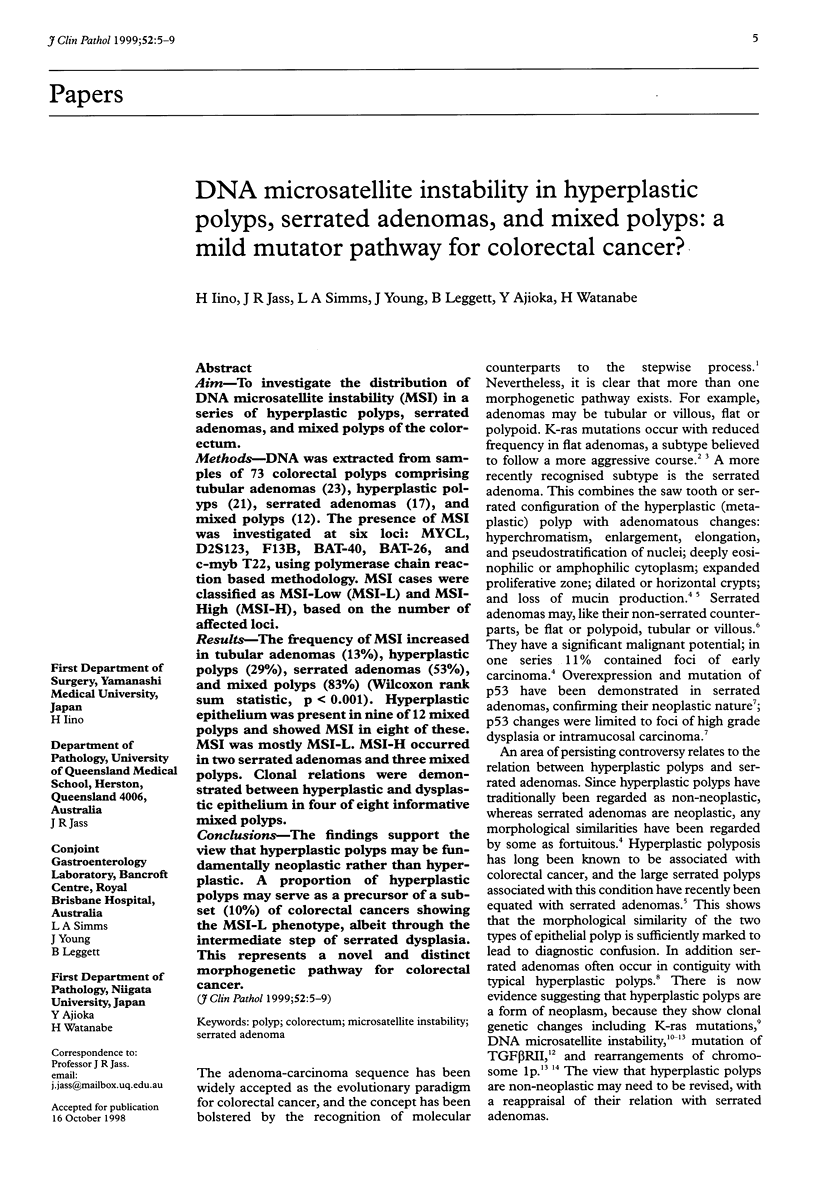
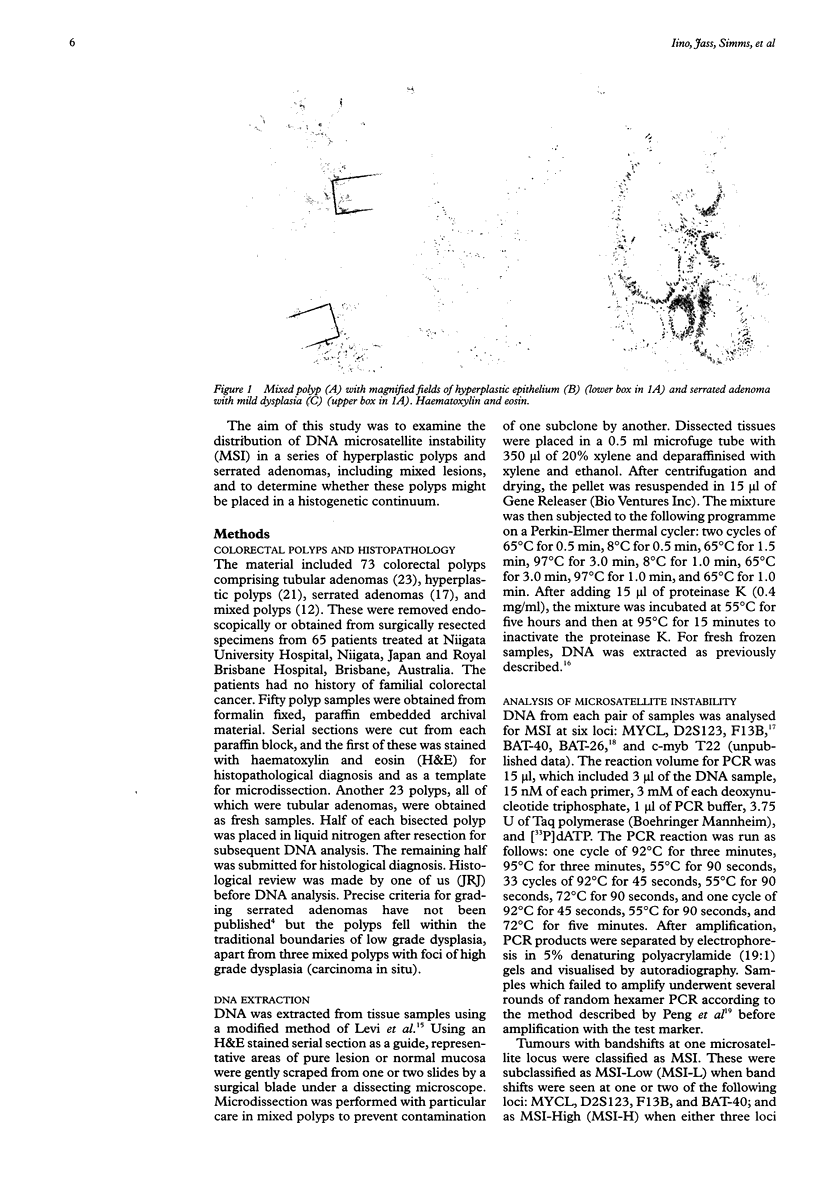
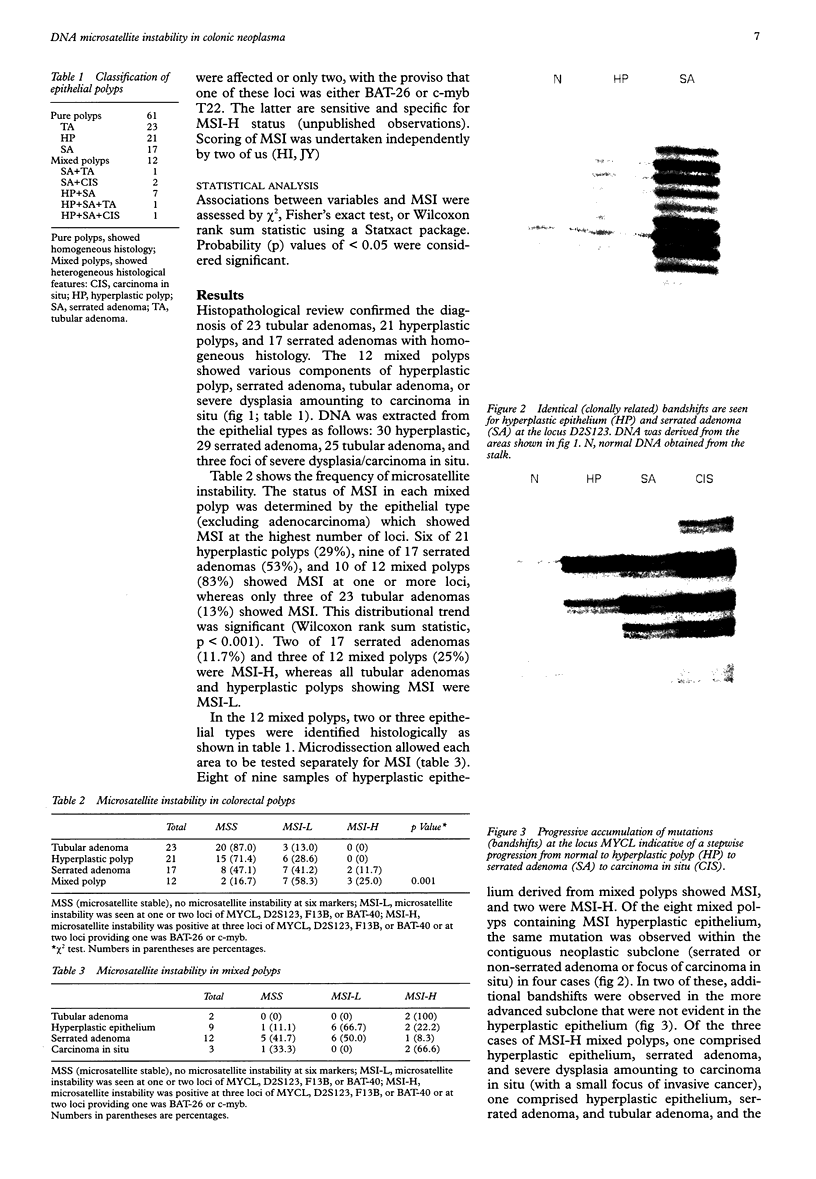
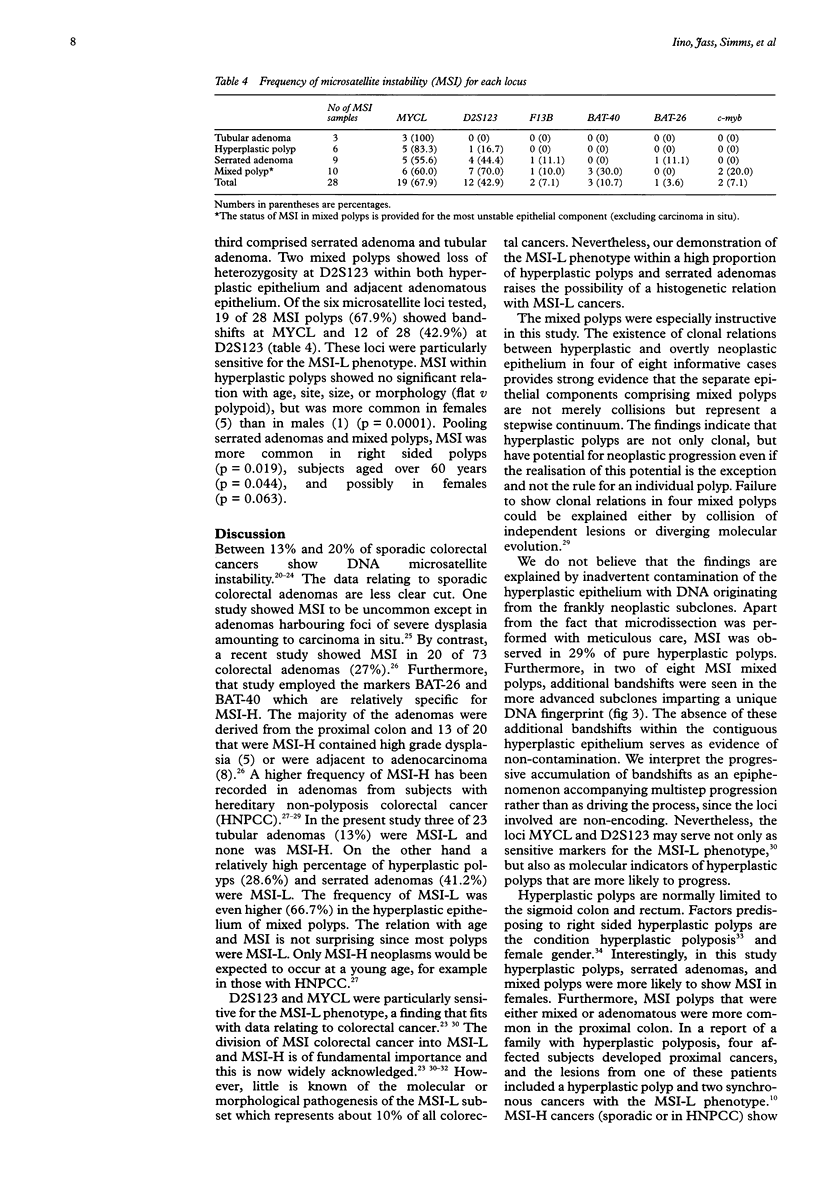
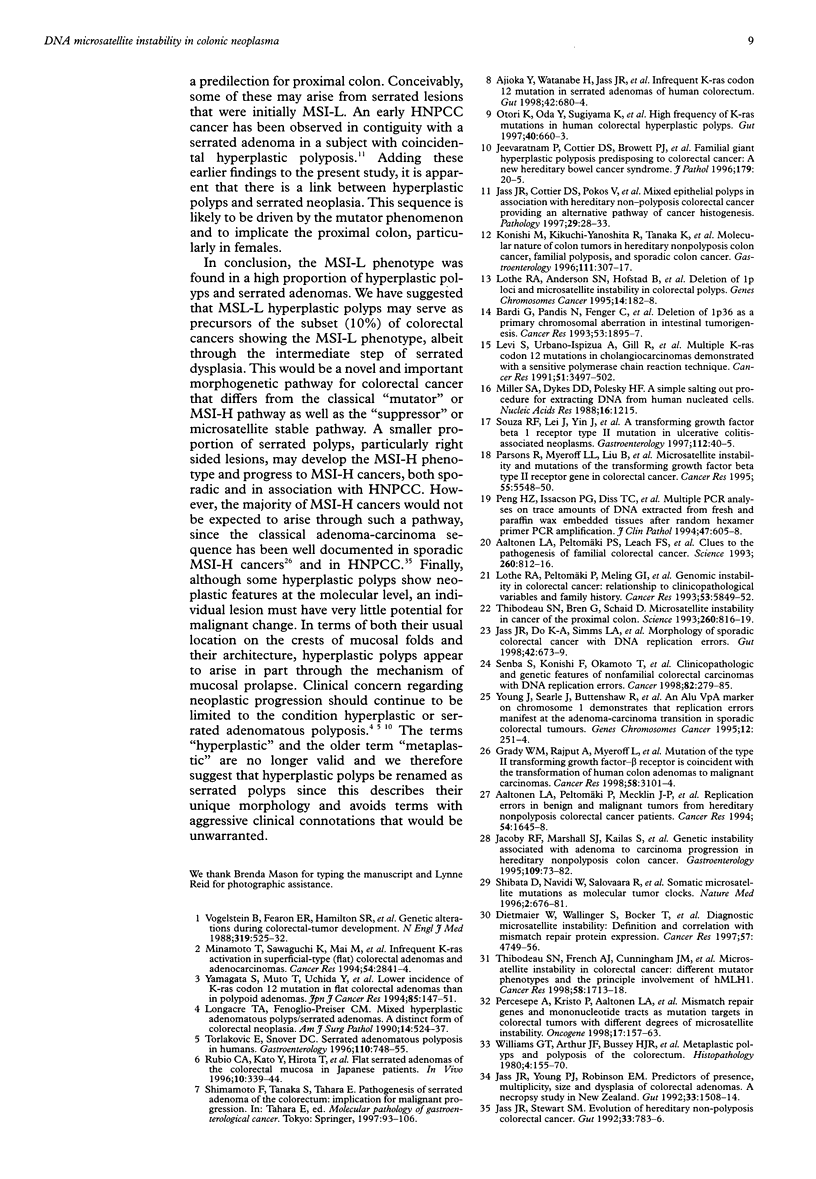
Images in this article
Selected References
These references are in PubMed. This may not be the complete list of references from this article.
- Aaltonen L. A., Peltomäki P., Leach F. S., Sistonen P., Pylkkänen L., Mecklin J. P., Järvinen H., Powell S. M., Jen J., Hamilton S. R. Clues to the pathogenesis of familial colorectal cancer. Science. 1993 May 7;260(5109):812–816. doi: 10.1126/science.8484121. [DOI] [PubMed] [Google Scholar]
- Aaltonen L. A., Peltomäki P., Mecklin J. P., Järvinen H., Jass J. R., Green J. S., Lynch H. T., Watson P., Tallqvist G., Juhola M. Replication errors in benign and malignant tumors from hereditary nonpolyposis colorectal cancer patients. Cancer Res. 1994 Apr 1;54(7):1645–1648. [PubMed] [Google Scholar]
- Ajioka Y., Watanabe H., Jass J. R., Yokota Y., Kobayashi M., Nishikura K. Infrequent K-ras codon 12 mutation in serrated adenomas of human colorectum. Gut. 1998 May;42(5):680–684. doi: 10.1136/gut.42.5.680. [DOI] [PMC free article] [PubMed] [Google Scholar]
- Bardi G., Pandis N., Fenger C., Kronborg O., Bomme L., Heim S. Deletion of 1p36 as a primary chromosomal aberration in intestinal tumorigenesis. Cancer Res. 1993 Apr 15;53(8):1895–1898. [PubMed] [Google Scholar]
- Dietmaier W., Wallinger S., Bocker T., Kullmann F., Fishel R., Rüschoff J. Diagnostic microsatellite instability: definition and correlation with mismatch repair protein expression. Cancer Res. 1997 Nov 1;57(21):4749–4756. [PubMed] [Google Scholar]
- Grady W. M., Rajput A., Myeroff L., Liu D. F., Kwon K., Willis J., Markowitz S. Mutation of the type II transforming growth factor-beta receptor is coincident with the transformation of human colon adenomas to malignant carcinomas. Cancer Res. 1998 Jul 15;58(14):3101–3104. [PubMed] [Google Scholar]
- Jacoby R. F., Marshall D. J., Kailas S., Schlack S., Harms B., Love R. Genetic instability associated with adenoma to carcinoma progression in hereditary nonpolyposis colon cancer. Gastroenterology. 1995 Jul;109(1):73–82. doi: 10.1016/0016-5085(95)90270-8. [DOI] [PubMed] [Google Scholar]
- Jass J. R., Cottier D. S., Pokos V., Parry S., Winship I. M. Mixed epithelial polyps in association with hereditary non-polyposis colorectal cancer providing an alternative pathway of cancer histogenesis. Pathology. 1997 Feb;29(1):28–33. doi: 10.1080/00313029700169494. [DOI] [PubMed] [Google Scholar]
- Jass J. R., Do K. A., Simms L. A., Iino H., Wynter C., Pillay S. P., Searle J., Radford-Smith G., Young J., Leggett B. Morphology of sporadic colorectal cancer with DNA replication errors. Gut. 1998 May;42(5):673–679. doi: 10.1136/gut.42.5.673. [DOI] [PMC free article] [PubMed] [Google Scholar]
- Jass J. R., Stewart S. M. Evolution of hereditary non-polyposis colorectal cancer. Gut. 1992 Jun;33(6):783–786. doi: 10.1136/gut.33.6.783. [DOI] [PMC free article] [PubMed] [Google Scholar]
- Jass J. R., Young P. J., Robinson E. M. Predictors of presence, multiplicity, size and dysplasia of colorectal adenomas. A necropsy study in New Zealand. Gut. 1992 Nov;33(11):1508–1514. doi: 10.1136/gut.33.11.1508. [DOI] [PMC free article] [PubMed] [Google Scholar]
- Konishi M., Kikuchi-Yanoshita R., Tanaka K., Muraoka M., Onda A., Okumura Y., Kishi N., Iwama T., Mori T., Koike M. Molecular nature of colon tumors in hereditary nonpolyposis colon cancer, familial polyposis, and sporadic colon cancer. Gastroenterology. 1996 Aug;111(2):307–317. doi: 10.1053/gast.1996.v111.pm8690195. [DOI] [PubMed] [Google Scholar]
- Levi S., Urbano-Ispizua A., Gill R., Thomas D. M., Gilbertson J., Foster C., Marshall C. J. Multiple K-ras codon 12 mutations in cholangiocarcinomas demonstrated with a sensitive polymerase chain reaction technique. Cancer Res. 1991 Jul 1;51(13):3497–3502. [PubMed] [Google Scholar]
- Longacre T. A., Fenoglio-Preiser C. M. Mixed hyperplastic adenomatous polyps/serrated adenomas. A distinct form of colorectal neoplasia. Am J Surg Pathol. 1990 Jun;14(6):524–537. doi: 10.1097/00000478-199006000-00003. [DOI] [PubMed] [Google Scholar]
- Lothe R. A., Andersen S. N., Hofstad B., Meling G. I., Peltomäki P., Heim S., Brøgger A., Vatn M., Rognum T. O., Børresen A. L. Deletion of 1p loci and microsatellite instability in colorectal polyps. Genes Chromosomes Cancer. 1995 Nov;14(3):182–188. doi: 10.1002/gcc.2870140305. [DOI] [PubMed] [Google Scholar]
- Lothe R. A., Peltomäki P., Meling G. I., Aaltonen L. A., Nyström-Lahti M., Pylkkänen L., Heimdal K., Andersen T. I., Møller P., Rognum T. O. Genomic instability in colorectal cancer: relationship to clinicopathological variables and family history. Cancer Res. 1993 Dec 15;53(24):5849–5852. [PubMed] [Google Scholar]
- Miller S. A., Dykes D. D., Polesky H. F. A simple salting out procedure for extracting DNA from human nucleated cells. Nucleic Acids Res. 1988 Feb 11;16(3):1215–1215. doi: 10.1093/nar/16.3.1215. [DOI] [PMC free article] [PubMed] [Google Scholar]
- Minamoto T., Sawaguchi K., Mai M., Yamashita N., Sugimura T., Esumi H. Infrequent K-ras activation in superficial-type (flat) colorectal adenomas and adenocarcinomas. Cancer Res. 1994 Jun 1;54(11):2841–2844. [PubMed] [Google Scholar]
- Otori K., Oda Y., Sugiyama K., Hasebe T., Mukai K., Fujii T., Tajiri H., Yoshida S., Fukushima S., Esumi H. High frequency of K-ras mutations in human colorectal hyperplastic polyps. Gut. 1997 May;40(5):660–663. doi: 10.1136/gut.40.5.660. [DOI] [PMC free article] [PubMed] [Google Scholar]
- Parsons R., Myeroff L. L., Liu B., Willson J. K., Markowitz S. D., Kinzler K. W., Vogelstein B. Microsatellite instability and mutations of the transforming growth factor beta type II receptor gene in colorectal cancer. Cancer Res. 1995 Dec 1;55(23):5548–5550. [PubMed] [Google Scholar]
- Peng H. Z., Isaacson P. G., Diss T. C., Pan L. X. Multiple PCR analyses on trace amounts of DNA extracted from fresh and paraffin wax embedded tissues after random hexamer primer PCR amplification. J Clin Pathol. 1994 Jul;47(7):605–608. doi: 10.1136/jcp.47.7.605. [DOI] [PMC free article] [PubMed] [Google Scholar]
- Percesepe A., Kristo P., Aaltonen L. A., Ponz de Leon M., de la Chapelle A., Peltomäki P. Mismatch repair genes and mononucleotide tracts as mutation targets in colorectal tumors with different degrees of microsatellite instability. Oncogene. 1998 Jul 16;17(2):157–163. doi: 10.1038/sj.onc.1201944. [DOI] [PubMed] [Google Scholar]
- Rubio C. A., Kato Y., Hirota T., Muto T. Flat serrated adenomas of the colorectal mucosa in Japanese patients. In Vivo. 1996 May-Jun;10(3):339–343. [PubMed] [Google Scholar]
- Senba S., Konishi F., Okamoto T., Kashiwagi H., Kanazawa K., Miyaki M., Konishi M., Tsukamoto T. Clinicopathologic and genetic features of nonfamilial colorectal carcinomas with DNA replication errors. Cancer. 1998 Jan 15;82(2):279–285. [PubMed] [Google Scholar]
- Shibata D., Navidi W., Salovaara R., Li Z. H., Aaltonen L. A. Somatic microsatellite mutations as molecular tumor clocks. Nat Med. 1996 Jun;2(6):676–681. doi: 10.1038/nm0696-676. [DOI] [PubMed] [Google Scholar]
- Thibodeau S. N., Bren G., Schaid D. Microsatellite instability in cancer of the proximal colon. Science. 1993 May 7;260(5109):816–819. doi: 10.1126/science.8484122. [DOI] [PubMed] [Google Scholar]
- Thibodeau S. N., French A. J., Cunningham J. M., Tester D., Burgart L. J., Roche P. C., McDonnell S. K., Schaid D. J., Vockley C. W., Michels V. V. Microsatellite instability in colorectal cancer: different mutator phenotypes and the principal involvement of hMLH1. Cancer Res. 1998 Apr 15;58(8):1713–1718. [PubMed] [Google Scholar]
- Torlakovic E., Snover D. C. Serrated adenomatous polyposis in humans. Gastroenterology. 1996 Mar;110(3):748–755. doi: 10.1053/gast.1996.v110.pm8608884. [DOI] [PubMed] [Google Scholar]
- Vogelstein B., Fearon E. R., Hamilton S. R., Kern S. E., Preisinger A. C., Leppert M., Nakamura Y., White R., Smits A. M., Bos J. L. Genetic alterations during colorectal-tumor development. N Engl J Med. 1988 Sep 1;319(9):525–532. doi: 10.1056/NEJM198809013190901. [DOI] [PubMed] [Google Scholar]
- Williams G. T., Arthur J. F., Bussey H. J., Morson B. C. Metaplastic polyps and polyposis of the colorectum. Histopathology. 1980 Mar;4(2):155–170. doi: 10.1111/j.1365-2559.1980.tb02909.x. [DOI] [PubMed] [Google Scholar]
- Yamagata S., Muto T., Uchida Y., Masaki T., Sawada T., Tsuno N., Hirooka T. Lower incidence of K-ras codon 12 mutation in flat colorectal adenomas than in polypoid adenomas. Jpn J Cancer Res. 1994 Feb;85(2):147–151. doi: 10.1111/j.1349-7006.1994.tb02075.x. [DOI] [PMC free article] [PubMed] [Google Scholar]
- Young J., Searle J., Buttenshaw R., Thomas L., Ward M., Chenevix-Trench G., Leggett B. An Alu VpA marker on chromosome I demonstrates that replication errors manifest at the adenoma-carcinoma transition in sporadic colorectal tumors. Genes Chromosomes Cancer. 1995 Apr;12(4):251–254. doi: 10.1002/gcc.2870120403. [DOI] [PubMed] [Google Scholar]




